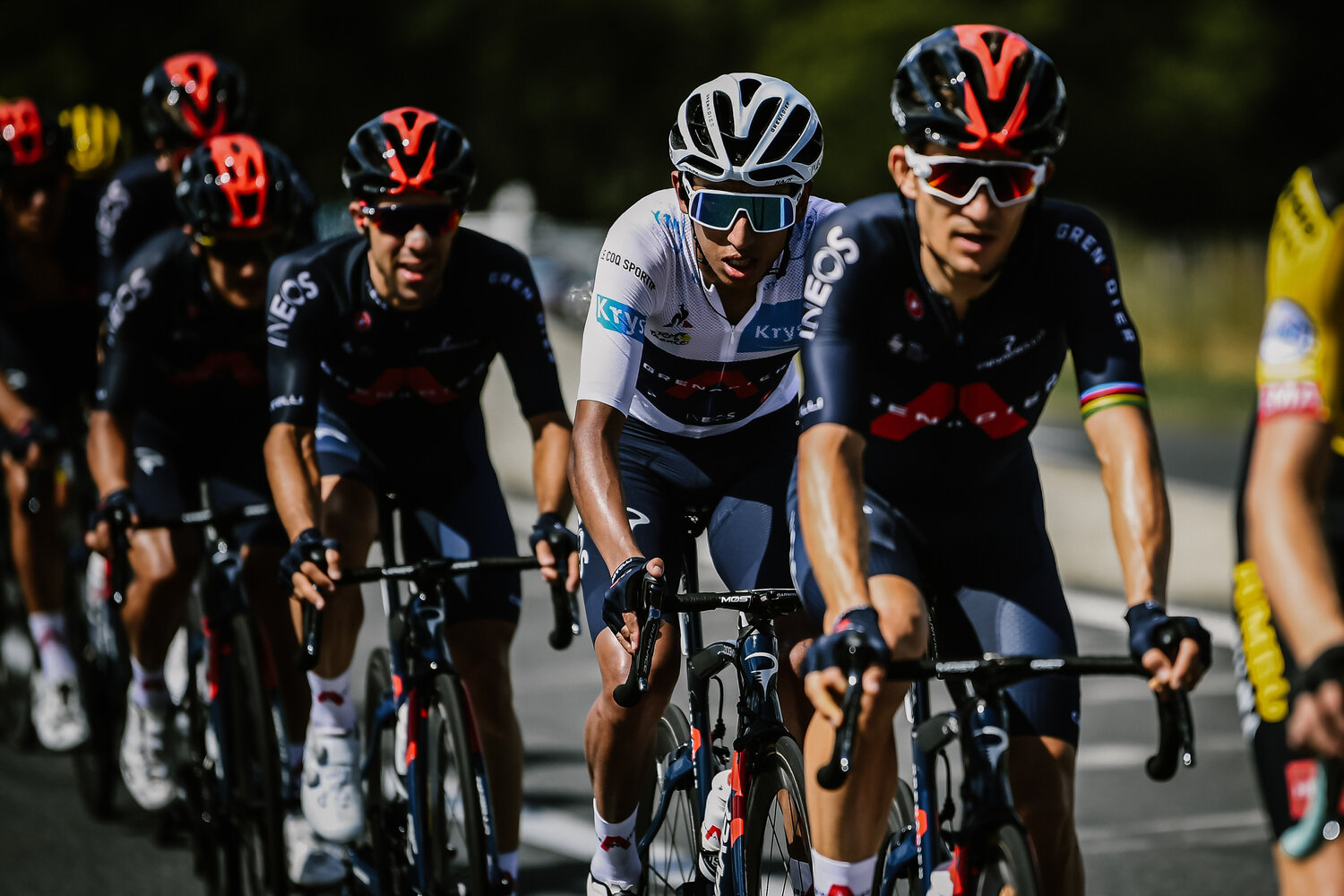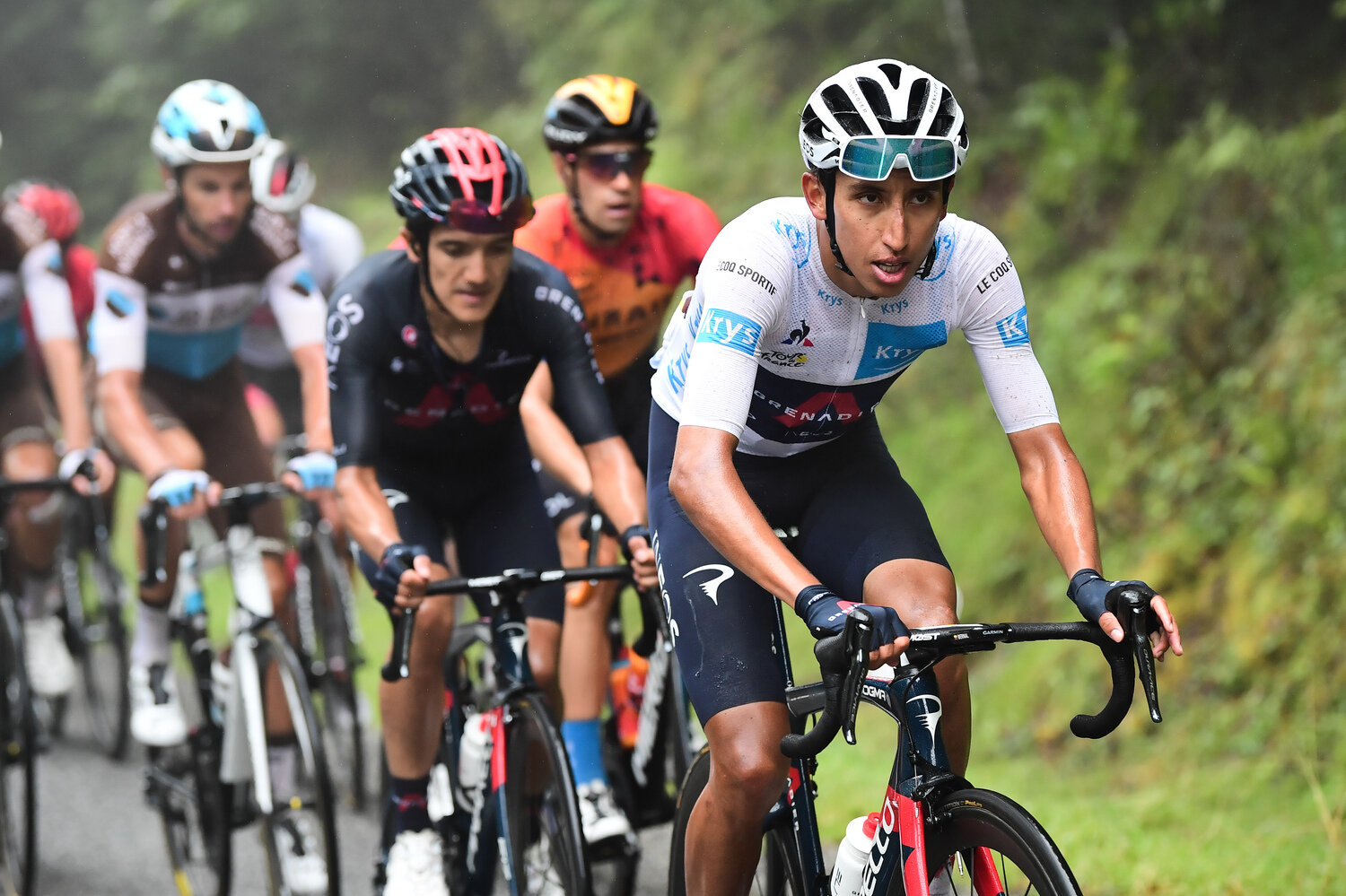Egan Bernal's Tumultuous Tour de France
Egan Bernal is an easy rider to root for.
He is the first Colombian to win the Tour de France. He is one of the youngest ever winners of the race, as well as a member of a super star generation of young riders lighting up the peloton. He upset the British control of the race, even though he rides for the same team who delivered Bradley Wiggins, Chris Froome, and Geraint Thomas to victory.
But Bernal’s performance today was further confirmation that the defending champion is struggling. If this trend continues, he won’t land on the podium in Paris.
Credit: A.S.O./Pauline Ballet
Stage 13 climbed 4400 meters (over 14,000 feet!) to a summit finish at the top of the Puy Mary climb in the Massif Central mountain range. EF Pro Cycling’s Daniel Martinez beat out two Bora-Hansgrohe riders to win from the breakaway, but the race for yellow was still being fought further down the mountain. Primož Roglič (Team Jumbo-Visma) defended his race lead with fellow Slovenian Tadej Pogačar (UAE Team Emirates) in tow. Bernal couldn't keep up—bleeding 38 seconds—which places him third overall and 59 seconds back.
"If I look at my figures, they are among the best values I have already set, Bernal said after the stage. “Then I just have to accept that the others are better."
In the weeks leading up to the Tour, there was speculation about Bernal’s fitness and health. He unexpectedly pulled out of the Critérium du Dauphiné, the traditional final test for Tour contenders, with rumored back pain.
There are two theories as to why Bernal did not continue in the Dauphiné. First, it is possible that he was suffering from some sort of back pain. Second, Bernal’s team could have determined that he needed rest—or different training—and that continuing in the race would not be beneficial to his fitness.
Either way, it’s not a good look to drop out of a race just weeks from the start of the Tour. In addition to Bernal himself, there are a number of factors related to his team that could be impactful.
On the sporting side of the equation, Froome and Thomas were left off the team’s roster. This summer, it was announced that Froome would be leaving Ineos at the end of the year for Israel Start-Up Nation. It’s rare for a team to bring a soon-departing rider to the Tour, and it seems that Ineos management have lost confidence in Froome’s ability to win.
Thomas’ case is more complicated. He was not on his best form at the Dauphiné, but today he was runner-up on a climbing stage at Tirreno-Adriatico. Thomas was disappointed to be left off the roster, and he has said he wants to compete at the Tour again. While the riders stay mum, there are always rumours of internal politics at Ineos.
“I feel that I’m at the stage of my career now where I want to make the most of every year,” Thomas told The Guardian. “I’ve done so much for other people throughout my career.”
Perhaps Thomas wouldn’t cede leadership to Bernal?
It has been argued that even if Thomas was not in tip-top shape, his knowledge of the race could come in handy as a road captain or super domestique. There’s no doubt that the experience of riders like Froome and Thomas could have aided Ineos along the route, but that hinges on their fitness and willingness to work for Bernal.
In March, Ineos Grenadiers sports director Nicolas Portal died from a heart attack. Portal was involved with all of Ineos’ Tour wins, making him a wealth of behind-the-scenes knowledge. In order to achieve success, a rider needs not only physical toughness, but also mental toughness. It’s possible that the loss of a close colleague is on the mind of the team and impacting their racing.
During such a tumultuous year, it’s understandable that Ineos would be off their game. José Been has argued that this is precisely why Bernal is struggling this year. Ineos wins because of their meticulous preparation and infamous marginal gains philosophy. But this year, COVID-19 has upended everything, and they are not in their usual routine.
Credit: ASO / Alex Broadway
There are a few scenarios where Bernal could salvage his trip around France. Many are speculating that the Colombian will find his form in the Tour’s tough third week in the Alps. Bernal is used to training on high altitude climbs, and that’s how he got his lead last year. This scenario, however, relies on the unknown state of Bernal’s fitness.
Another unknown is the endurance of Bernal’s rivals. Roglič has had a near-perfect race. Though sitting in second place, Pogačar lost time in the crosswinds of Stage 7, a reminder that anything can knock a racer off the pace. The easiest way for Bernal to make up time is for Roglič and Pogačar to lose time, which may or may not happen.
A critical stage will be the time trial on stage 20. The first 30 kilometres are flat, with gradual climbing, then the final 6 kilometres up La Planche des Belles Filles averages 8.5%. The only time trial along the route, this stage is exciting because of the climbing finale. The general classification contenders must set a good time. Equipment choice makes this stage even more interesting. It’s possible that riders will start on their time trial bike and then switch to their road bike at the base of the climb. This decision could significantly impact the results.
Nearly one minute. 59 seconds. That’s the current gap between Bernal and the maillot jaune. It’s enough to claw back, and it’s possible to lose more seconds. Bernal must remain optimistic.

